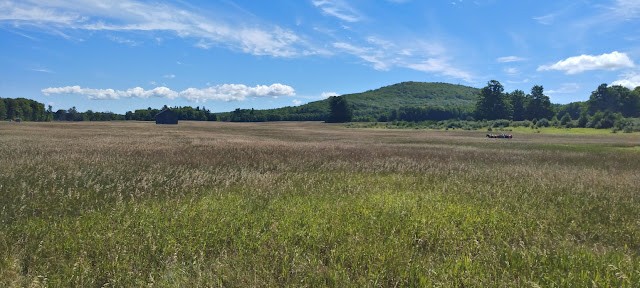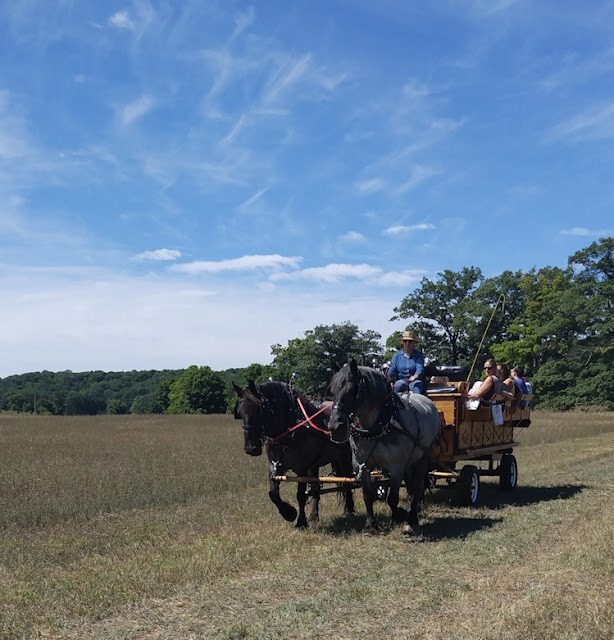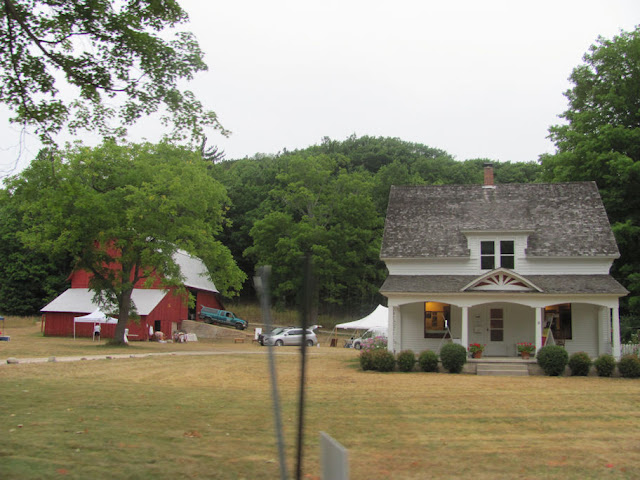Contrary to what one may think, historic farming is very popular these days. Folks are interested in going back to their roots, not only as a nation, but as a people - as humankind - and the regard for where we came from is high and getting higher. With current politics being an in-your-face and often a hate-filled pasttime by too many extremists on all sides of the "battle front," those of us in the middle - by far the greater majority - are wanting to get away from that stress and extremism and, instead, look at our world in a different way, and see our daily lives, past & present, and finding ways to intertwine them. People, whether they lean conservative, liberal, or all points in between, are looking for ways to bring the best of days gone by to the now, and it seems that organic non-gmo heirloom farming, with absolutely no pesticides and the use of heirloom seeds, tends to be, above all, the most popular.
I think it's pretty darn cool!
......................................
Imagine a fair based in and around historic farms and farming practices.
I mean an actual fair filled with rural tradition.
"Yeah, Ken," you say, "but people aren't into that like you are. No one would come."
You would be wrong, for, as the Traverse City web site states:
 |
| Here we are, Larissa and I back at the historic Olsen Farm ready to do our 19th century farming presentations after a two year covid hiatus. It's good to be back! |
Once again, the Port Oneida Rural Historic District of Sleeping Bear Dunes National Lakeshore will be full of activities both Friday and Saturday for the Port Oneida Fair. Visitors are invited to step back in time to actively experience life as it was in this once active community of robust farms of the late 1800s and early 1900s. The fair promotes the preservation of rural traditional skills, crafts, landscapes, and communities of the Upper Great Lakes Region.
And Port Oneida's own web site says:
"Step back in time at the Port Oneida Fair and experience life as it was in the late 1800's and early 1900's. Imagine the life of the pioneers as you help bale hay or watch a broom-maker at work. Learn about spinning, basket weaving, soap making, butter making, candle dipping, and fur trapping. Listen as park rangers and local history experts share the area's history. Watch as teams of oxen and horses cut, load, and haul hay and artists and craftsmen demonstrate their skills."
And this is what my presentation partner, Larissa, and I both were a part of in mid-August. In fact, we've been presenting historic farm life up here since 2016!
And it has been an amazing experience for us, for the crowds are large - yes, people are truly interested in historic farming practices and all that goes with the times.
We did four presentations on the Friday of the event, as we usually do. In fact, as I wrote on my Facebook page:
Got up at 4 am, left just after 5, got to Port Oneida (Sleeping Bear Dunes in the northern lower peninsula) close to 10, did four historic farming presentations at a historic farm fair, left around 5:00 pm, and made it home by 9:30 tonight.
A whirlwind of a day, but a great time with awesome crowds - some of which came back from previous years just to see our presentation!
That just about sums it all up.
Our presentations are not just a show 'n' tell and kill 'em with facts and information; we tell a story of a complete year of our 1860s lives - all four seasons and the chores that come with them - and over the years we have honed our story into what could have been a very real situation that tends to draw our audience into our world of the past:
We are a farm family with around 80 acres of good land in which to grow our crops. However, we have been blessed with only two children - and they are both girls. It seems that all historic stories and movies show farm families as having a dozen kids - six boys and six girls...you know, the perfect farm family...and everything runs like clockwork. Well, we know that life wasn't always as what Hollywood (or storybooks) like to show, hence the reason why we decided ours would have that bit of realism added to it by having two daughters only - no sons. And the audience definitely took note of that situation.
As our story goes, my sister, who married a man that did very well for himself in the mercantile trade, offered to send our eldest daughter, Christine, who is 16, to a finishing school in the big city in hopes of her learning to be a fine lady instead of living the life of a farmer's daughter.
And that's where the conundrum occurs; because we have no sons, I've / we've raised Christine to do traditionally boy's chores, and thus, while our younger daughter, Jill, is helping mom in the kitchen with the preparation & cooking of meals, along with house cleaning, clothes washing & mending, soap and candle making, emptying chamber pots, and other duties, Christine is spending the four seasons of the year out in the fields with me doing farm chores normally reserved for the male sex, including manuring, plowing, harrowing, planting, harvesting, hauling, fence mending, tapping trees to make maple syrup, banking the house against the cold weather, and other necessities that need to be done.
And because of the help I need completing these chores, Larissa and I then discuss with the audience how necessary it is to have Christine remain with us rather than send her off to some fancy school.
You see, at the end of our presentation, we leave it to the audience to help us in our decision by asking them what should we do - send Christine away to finishing school or have her remain with us.
More often than not, the audience votes to have her remain with us, for they realize how much we depend on her help.
In addition to our little tale we also speak about our clothing, show our period house and farm accessories, and throw in a little bit of fun humor to keep it lite, all the while visiting each of the four seasons of the year and the chores that come with each.
Meanwhile, inside the Olsen Farm:
 |
| Susan Odom |
 |
| Together again. |
They've had numerous women in the kitchen of the Olsen Farm. This year they got Susan Odom to do the cooking demonstration, and she made bread and an apricot pie...with a twist; "I added a few Cherry Olives for spice. Cherry olives are a sweet spiced pickled made with dark sweet cherries whole, not pitted."
Oh! The wonderful odors that emanated when one entered!
And I got to try some! The benefits of being a historic presenter can be delicious!
It was so good to see Susan again. She used to be a Firestone Farm presenter at Greenfield Village years ago. In fact, Larissa mentioned that it was Susan who was her mentor there and taught her many things on 1880s farm life. I remember Susan working there all those years ago (she left the Village in 2005), and through Facebook we've reconnected and become friends again.
Susan now owns and operates Hillside Homestead, where overnight lodging and historic dinner experiences in an authentic 1910 farmhouse is offered to guests. As Susan writes: "You will feel transported back in time!"
There were other historic crafts taking place, including...
 |
| Blacksmithing...and... |
 |
| ...pottery... |
...just a heaping helping of traditions...
Back to Larissa and I:
As part of our presentation, we also speak of our clothing. I will usually ask if I look like a farmer in my attire. Every time I get a solid "no." When people think of old-time farmers, their minds go to the old man wearing overalls, not the clothing they see me in. So, as part of my clothing explanation, I also get into a bit of 19th century etiquette as well, including how I would act if a female neighbor happened by, including a greeting with the complete removal of my hat - not the tipping as what was more acceptable later in the century - and making sure my sack coat was on.
Larissa gets, shall we say, a bit deeper into the whole fashion thing, for there is much more for her to speak on. It seems everyone, men & women, have an interest in what women wore back then, and she shows them, in a polite manner, layer by layer. And, as you see in the photo below, she'll usually have a young lady come up with her to help her keep count of the number of layers she has on.
We've also ventured into colonial farming as well as historical founders Sybil Ludington and Paul Revere.
With all of this, it's always a pleasure to present in Port Oneida every year, for the interest from the spectators continues to grow.
So, yeah, historic farm life is our forte', whether Victorian or colonial, and we both enjoy doing this very much. I am hoping to continue at Port Oneida for some time to come. I suppose as long as we can keep the large audience, we should be okay.
So, until next time, see you in time.
Here is an excellent collection on various historic British farming (which is pretty much the same as historic farming in America) - click HERE
To read what it was like to spend a year on an 18th century farm, click HERETo read about Victorian farming at harvest time, click HERE
~ ~ ~







No comments:
Post a Comment